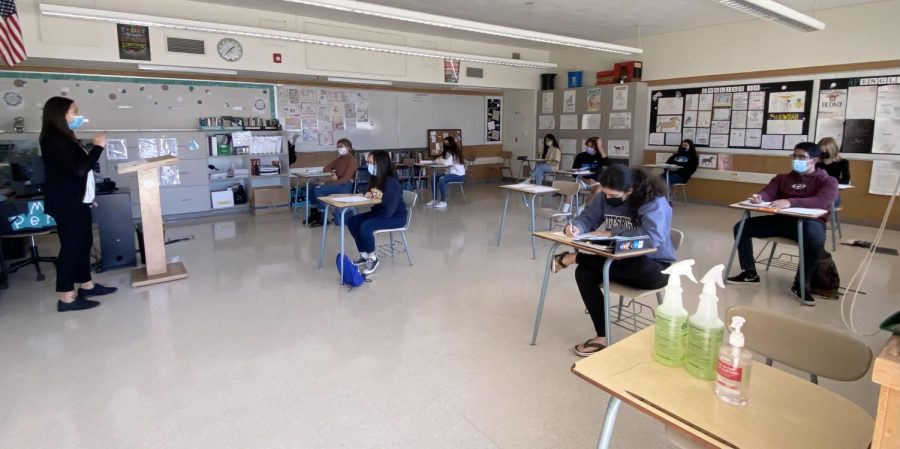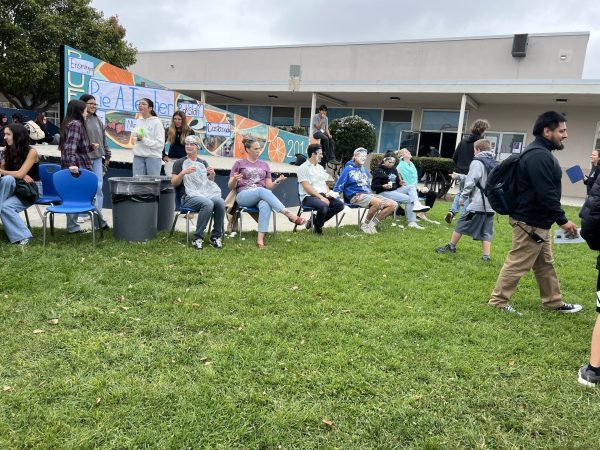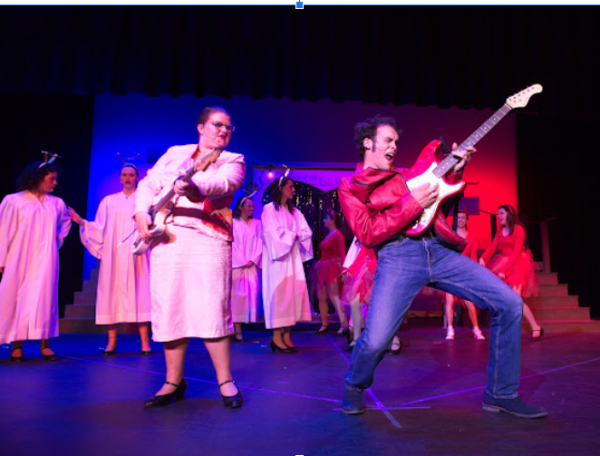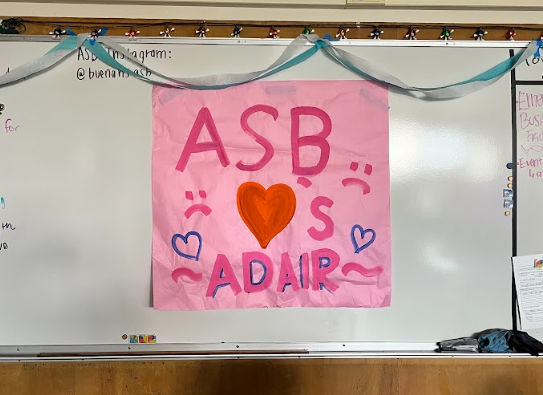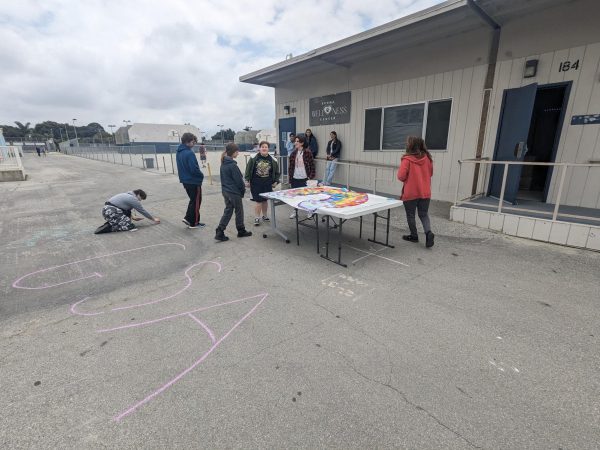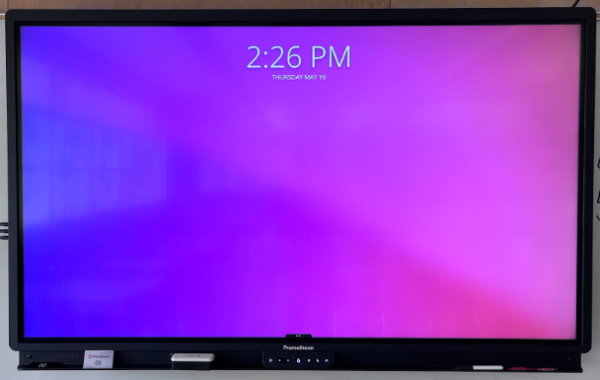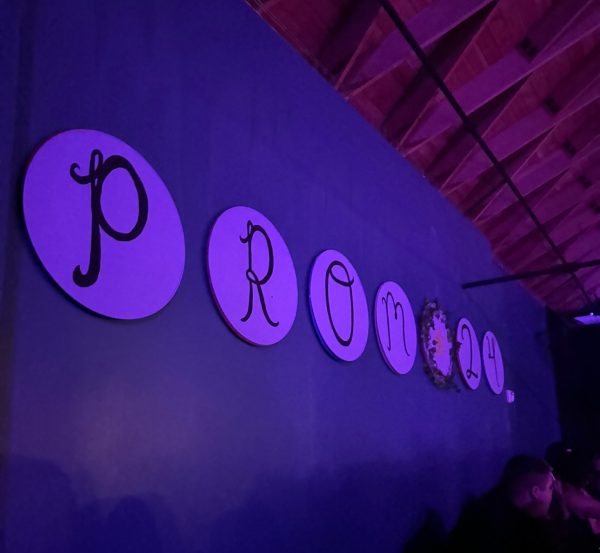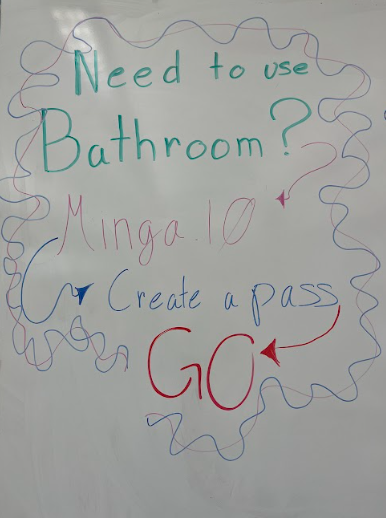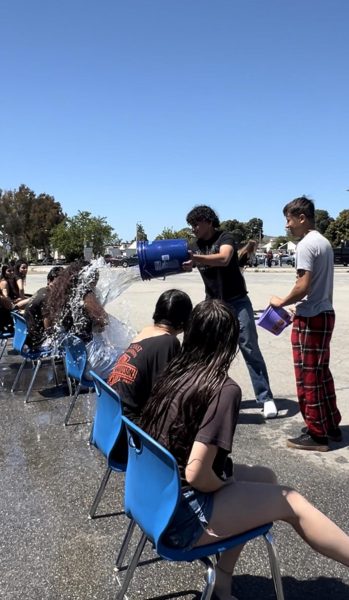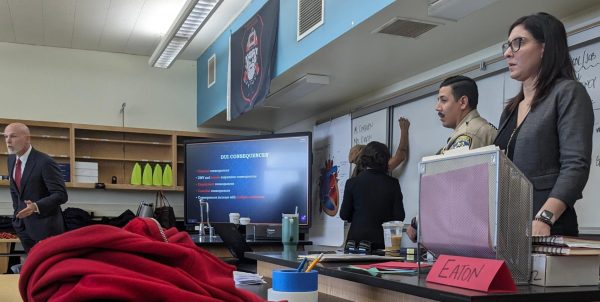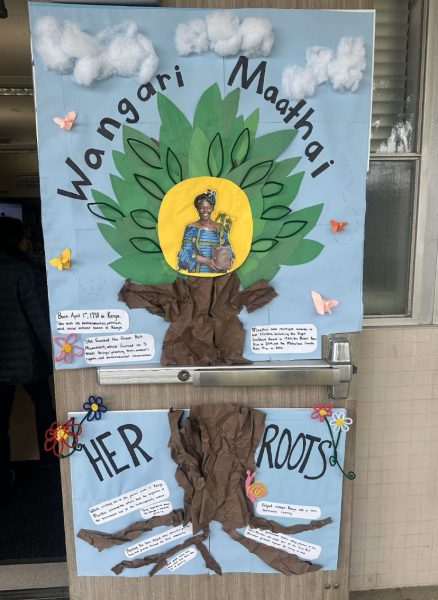One small step for a few, One giant step for Buena
Students return to classrooms in small learning groups
Dec. 3, Antoinette Perez teaching her small group of AP English language and composition students, about what to expect on the multiple choice questions for the AP English language and composition exam, and how to be best prepared to answer the questions. Students stay socially distant and focus as they use their own supplies to take notes.
Navigating the world of online learning has been difficult for most, and is a struggle that students and teachers have been trying to overcome since March, however the school administration is trying to give support to students by offering online tutoring for all subjects, which began Nov. 18, as well as small in-person learning groups, which began Nov. 9, that students can join.
“[Small in-person groups] were proposed by the district to help supplement students who are struggling,” principal Bobbi Power said, “I have already heard from many teachers that the students that were struggling have been helped by the small groups.”
Learning pods are groups of students come to school for their core or elective subjects to get assistance from their teachers. In the interest of fairness, no homework is assigned. Rather, students only receive help for what they are already learning in their Zoom class. Students are also allowed to not attend class if they do not feel well or may choose to not continue if they feel they no longer need the extra support.
I think [small groups are] an opportunity for us all… to not just hide behind the screen when we’re struggling,
— Antoinette Perez
This program is not advertised on the Ventura Unified School District website or Buena high school website because, “there is a protocol the district has set that we need to follow”, Powers said. Another reason is that both teachers and students can choose whether they would like to participate in the groups or not. Therefore, if a student wants to participate in a small group with their teacher, there would first need to be a teacher willing to teach that group. In the same regard, a teacher who wants to teach a small group needs to have enough students interested in attending, at least 15 students to be precise. This is why small groups are not offered to all students and teachers.
“We also cannot have all kids returning, so certain kids were targeted to help,” Powers said. “So the teachers knew which students needed help and they targeted those students.”
Teacher of English 10 Honors, ELD English, and AP English language and composition, Antoinette Perez, was “excited” to see some of her students in class again “it was an opportunity that [she] jumped on” when she first learned that teachers were allowed to form their small groups. “I think [small groups are] an opportunity for us all… to not just hide behind the screen when we’re struggling,” Perez said. “When you get to class you’re distant from people, everyone is wearing a mask, no one gets close to you, so I’m not concerned- I feel pretty safe.”
Perez is using small groups as a way to help her AP Literature students. With small groups, the district requires that teachers spend at least two hours a week with their teacher. However, teachers can still choose how to break up those hours, how many students will be in groups, and choose what days they want to be with their groups.
“I announced to all of my classes as soon as we got word we could actually do [small groups]. I sent a Google form to my students and asked ‘Would you be interested in this?´¨Perez said. “I also sent out an email to parents, so all of my students were notified and had the opportunity to do it.”
Students who are able to go to these small groups, like senior Sahel Schaab who is taking an AP Literature class with Ms. Herrera, thinks “it’s a cool experience to be back in the classrooms” despite restrictions.
“I joined because I love literature- english, writing, I love that type of thing,” Schaab said. “I also never took an AP English class so I wanted to get a little bit of help outside of Zoom class.”
However, small groups are doing more than just teaching students, small groups help students “build personal relationships” with their teachers and their peers, Perez said.
“I am just so grateful to do this because I think there are some kids that really need to be connected,” Powers said.
I still encourage my students that if they can’t do small groups, schedule meetings with their teachers, go to office hours, and ask them for extra help,
— Antoinette Perez
A major concern, the spread of the Coronavirus, is an understandable fear for many students- or parents who are uncertain about the safety of small groups. However strict rules, restrictions, and protocol made by the district and school were put in place to keep all people involved with the groups “nice and healthy,” Powers said.
“We haven’t had any [problems] yet,” Powers said, “Knock on wood, you never know, but so far it’s been pretty good.”
Habits and rules that the school, teachers, and students partake in include wearing a mask on campus at all times, cleaning your hands with hand sanitizer before and after you enter and exit the classroom, assigned seats that remain the same, designated spots where students can be dropped off and picked up, set times that students may arrive, and regular cleaning of classrooms.
“[What I have been doing for example] is that I print things and I leave it on the students’ desks… There’s no collecting of papers either, the students keep them or depending on what the paper is about- they throw it in the trash,” Perez said, “I actually wipe down the seats with the products [the school] gave us, I wipe down the desks before and after they get there even though I know janitors do that, I do it to be extra safe.”
Still, for some students, this small group program is something they simply can’t participate in because they can’t afford the risk that comes when leaving their home either for their own health reasons or family members. Recognizing this, both teachers and administrators encourage students to make the most of other free resources which the school offers.
“I still encourage my students that if they can’t do small groups, schedule meetings with their teachers, go to office hours, and ask them for extra help,” Perez said, “I know most [teachers] are willing to meet one-on-one on Zoom multiple times a week just so you can get the help you need.”


